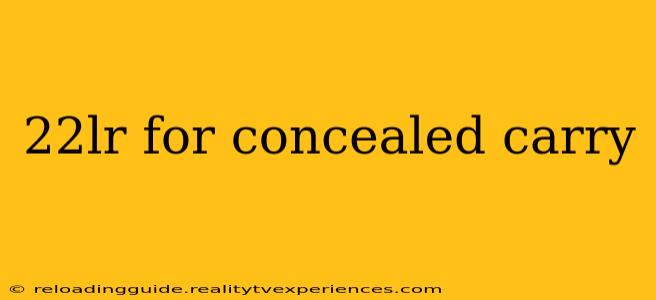The .22 Long Rifle (22LR) cartridge is a popular choice for many firearm enthusiasts, renowned for its affordability, low recoil, and ease of use. But is it a viable option for concealed carry? The answer, like many things in the firearms world, is nuanced and depends heavily on individual circumstances and priorities. Let's delve into the pros and cons to help you make an informed decision.
The Allure of the .22LR for Concealed Carry
Several factors contribute to the appeal of .22LR for concealed carry:
-
Lightweight and Compact: .22LR pistols are often smaller and lighter than their larger-caliber counterparts, making them easier to conceal and carry comfortably for extended periods. This is a significant advantage for individuals who prioritize comfort and discretion.
-
Low Recoil: The gentle recoil of the .22LR makes it exceptionally easy to shoot, even for those new to firearms or with limited upper body strength. This facilitates quicker target acquisition and follow-up shots, crucial in a self-defense scenario.
-
Affordability: Ammunition for .22LR is significantly cheaper than most other handgun calibers. This allows for more frequent practice, a critical aspect of responsible gun ownership and proficiency.
-
High Capacity Magazines: Many .22LR pistols boast high-capacity magazines, offering a greater number of rounds per reload compared to many larger calibers.
The Limitations of .22LR for Self-Defense
Despite its advantages, the .22LR suffers from limitations that make its suitability for self-defense a topic of ongoing debate:
-
Stopping Power: This is the most significant drawback. .22LR rounds generally lack the stopping power of larger calibers. While a well-placed shot can be effective, the smaller projectile and lower energy transfer may not reliably incapacitate a determined attacker.
-
Penetration: .22LR rounds may not penetrate sufficiently to stop a threat, particularly through clothing or obstacles. This reduces the likelihood of a single shot neutralizing a threat.
-
Accuracy: While easy to shoot, achieving consistent accuracy at longer ranges can be challenging with .22LR. This is particularly relevant in self-defense scenarios where accurate shot placement is paramount.
-
Reliability: While generally reliable, some .22LR firearms can be more susceptible to malfunctions due to the cartridge's smaller size and variations in ammunition quality.
Making the Right Choice: A Balanced Perspective
Choosing a concealed carry firearm is a deeply personal decision. While the .22LR offers advantages in terms of size, weight, recoil, and affordability, its limitations regarding stopping power and penetration must be carefully considered.
The .22LR might be a suitable option for concealed carry if:
- You prioritize concealability and ease of use above all else. For individuals with physical limitations or those who need a truly lightweight and easily concealable option, a .22LR might be preferable, despite its limitations.
- You are comfortable with the reduced stopping power and understand its implications. Accepting the limitations of .22LR and prioritizing shot placement and multiple accurate shots is critical.
- You live in an area with limited access to other calibers. In regions with restricted access to larger calibers, a .22LR might represent the best readily available self-defense option.
However, the .22LR is likely not the best choice if:
- Stopping power is your top priority. Larger calibers generally offer a much greater likelihood of immediately incapacitating a threat.
- You anticipate facing multiple attackers or threats. The lower stopping power of .22LR might make it less effective in such scenarios.
- You lack extensive firearm training and experience. Consistent accuracy is vital when relying on a less-powerful round.
Ultimately, the decision of whether or not to use a .22LR for concealed carry is a personal one, based on your individual needs, risk assessment, and training level. Thorough research, professional training, and honest self-assessment are crucial before making such a significant choice. Consult with firearms experts and experienced instructors to make the best decision for your specific circumstances. Remember, responsible gun ownership includes understanding the capabilities and limitations of your chosen firearm.

